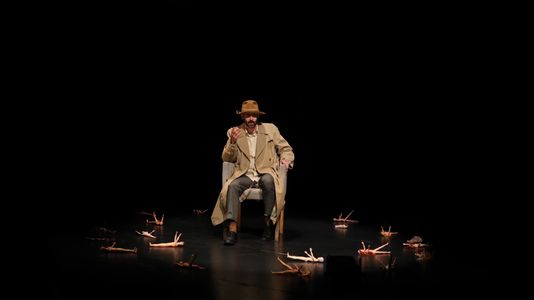
Emile Saba
Ashtar Theatre
Ashtar is the Canaanite goddess of war, sex, love and hunting. She is Venus, Aphrodite. She is fruit, fruition, fertile ground, life. It’s also a very special site of creation and lifeforce in the West Bank - and often globally.
Ashtar Theatre was born in 1991 from theatremakers Edward Muallem and Iman Aoun in Jerusalem. Their stage work dates back to the 70s including participating in the famed Jerusalem El-Hakawati troupe throughout the 80s.
Like its founding and present day members who have trained and performed all over the world, Ashtar Theatre is known for its progressive and dynamic global, political, and economic perspectives. It consistently and boldly challenges both the global and the everyday in terms of human observation.
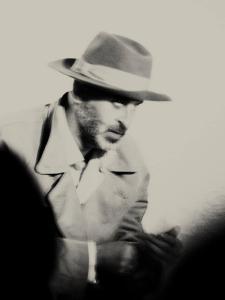
When Emile Saba joined his local theatre youth group as a 12 year old boy in 90s Ramallah, he couldn’t believe his eyes. He was in good company, finding his feet fast within an environment where he could express himself and learn about life beyond occupation.
In 2023 Saba was appointed artistic director. As a multi-hyphenate practitioner, his work has spanned global borders; he’s trained and toured internationally as an actor, producer and director. Therapeutic, futuristic theatre-making approaches support the foundations of a renowned grassroots group, founded in Jerusalem 1991 by stage veterans Edward Muallem and Iman Aoun. Their daughter, named Ashtar, is also a member of the present ensemble.
Psycho-social intervention has become more than a strand or workshop of the Ashtar. Their intensive programmes equip students and members of the ensemble with transferable skills beyond dramatics. Their qualifications reimagine the world view; they cast a spotlight on what agency really looks like.

In November 2023, they launched a worldwide interactive project, Gaza Monologues where real testimonials from young Gazans in 2010 were read, performed and broadcast on stage and in short films at locations all over earth. This was how I came to find the work of Ashtar, as I took part in the London call and livestream, facilitated and broadcast by Baesianz and Street Soundsystem (over thirty films on the International Day of Solidarity with the Palestinian People, November 29th). Doubtless, Ashtar’s initiative raised awareness and put voices into new mouths. In February, the company launched Letters to Gaza.
I was also fortunate to see their play Oranges and Stones (originally conceived in 2013) this summer in London. It deals with the illusions of the Balfour Declaration and symbolically, through physical theatre and no words, refers to Jaffa’s bounteous fruit being snatched from their possession, and to stones, the only weapon Palestinians had to defend themselves after the second intifada began. Played silently by Ashtar’s founding members, the story itself depicts a woman living alone, whose home is abruptly and violently invaded by a stranger with a large suitcase. It is as affecting as it is frustrating to watch. Understanding the images in 2024 clearer than ever is a devastating thing.
Emile spoke to me from Ramallah, in a colourful office with vivid posters from 1990s Ashtar productions behind his head.
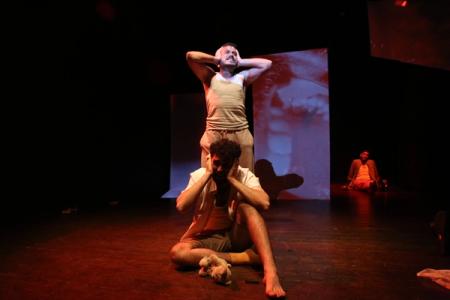
Emile, from a theatrical standpoint how do you navigate your land being so intrinsically linked to pain?
My land for me is linked to more than pain, like hope and resilience, but pain always lingers above us as Palestinians. More than often pain appears on the stage; in the stories, in the actors' voices, in the eyes of the audience.
I feel there is a conscious act of defying pain, as often the international audience demands Palestinian art to be about victimhood, loss, suffering and tales of the occupation. We strive to tell our stories as we live them; highlighting the human depth of Palestinians, our day to day life, our aspirations, demands, the things that don't usually make it on the news. Our life despite the occupation.
Edward (co-founder) has a face you can’t forget. I also saw him in a sort of advertorial for Ashtar right after its genesis in 2001. In fact, both he and Iman are very striking.
Iman and Edward, words don’t do them justice. I feel very lucky and privileged to be around them. They are the pillars of Ashtar Theatre. It’s very powerful to witness them play on stage, harnessing every inch of their energy and talent and convection in a silent piece, despite the fact that they are very outspoken individuals. Their performance is very haunting on so many levels.
Another thing that struck me was the diversity and freedom of the youth performers and the adults too in this video. There was a lot of expression captured even in those snippets - and the video was largely in Arabic, too. The Arab Evangelical Episcopal School is captured on film. It really depicts in some short moments, just how broad and intersectional - how open - Palestinian culture and faith is.
Which brings me to Oranges and Stones. Its director, Mojisola Adebayo (one of many international collaborators, signalling the company’s longtime aversion producing from an echo chamber) has described the obscuring language, or words, sometimes causes. The obscuring of very real realities. She describes a Beckettian, Butoh, slow-moving approach. Ashtar founder (and Oranges actor) Iman also commented that "it’s louder to present without words." How do Iman and Edward keep up this intense performance for so many years?
Oranges and Stones has grown into them as a second skin. The urge they have to take the story of Palestine feels like a duty and a life mission to show the world what happened to Palestine since 1948 and is still happening.
Iman Aoun says, “Every time we stem our urgency from the situation, that's what keeps us developing and looking for minute moments in the performance that would give us energy and keep the urgency flowing.”
The presence of the audience and the truth that it is developed with audience feedback and the director’s presence helps in developing the piece every time.Although the play tells the story of Palestine from the early Jewish immigration after WWII, going through Al-Nakba and the displacement of Palestinians, it still resonates strongly to the continued struggle of Palestinians all around the world, and it stands as a historical and stands as a living example of the power of theatre and art in spreading awareness about human causes.

You aren’t just a theatre company, you are a social and community space and entity. What has your journey through the company looked like, so far?
I started at the company as a young acting student and after graduating from its acting school, I continued acting in youth productions, training children and youth and directing for Youth Theatre. Later on, when I finished my MFA in stage acting from the University of Connecticut. I came back to Palestine, to work mainly with Ashtar as a director/actor, and I also ventured to other companies and groups in Palestine and abroad. It feels very surreal to become the artistic director of the same theatre I started at as a child.
Since taking on the new position, I am realizing more the importance of Ashtar as a company and a cultural institution in the Palestinian community and in the theatre scene.
Ashtar’s work extends beyond theatre productions. Our involvement in the society and in different communities is vital to our existence and continuation. The projects and workshops we lead are designed towards children, youth, professionals, amateurs, students and teachers.
Tell me about the genesis of Ashtar Theatre in relation to its current work.
From its beginning, the company has been a platform for freedom of expression, critical thinking and social justice.
Ashtar started the first acting school in Jerusalem and in the westbank, and for 34 years it is still continuing teaching and training youth and adults through our four-year acting program and diverse workshops, in schools, drama clubs, and in community organisations.
Iman Aoun (the previous artistic director and the current executive director) dreamed of establishing a performing arts academy, and in August 2024 we launched the first pilot intensive theatre and circus program, training 16 young adults over a course of four weeks in theatre and circus skills. We are preparing now and working effortlessly to establish the academy as part of an art village that combines theatre with circus and music in the town of Birzeit near Ramallah. The academy will be a two year program with a vocational degree in theatre and circus performance. Ashtar’s activity in the theatre of the oppressed is vital - and an ongoing program led by Edward Mullem. Recently during the war in Gaza we worked with Gazan youth in Doha. This year, we produced an original script written during the war by Naomi Wallace and Ismail Khalidi inspired by Picaso’s painting Guernica. The production premiered in July 2024, and is still running its local tour till March 2025.
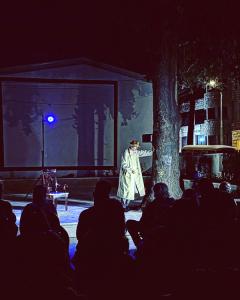
I also read about the despicable street attack during Eid 2022 and the theatre’s International Youth Festival (violent thugs invaded the festival and under false pretexts and allegations proceeded to brutally beat and injure both participants and onlookers). Endurance and resilience is built into Ashtar’s DNA, but it still was shocking. How was the aftermath, and what seemed to be the social problem here (if you care to comment, otherwise of course just delete this question!).
It was shocking to us as well, for years Ashtar and other cultural organisations have been performing in the streets of Ramallah and other Palestinian cities and villages. Street performances are part of the cultural identity. There was a systematic attack on cultural institutions at that time and we were one of them. That incident made us more convicted of the need for culture and art in any community.
Sanctions and law and difficulties have marred a number of the group’s global plans, but a number of your ensemble thankfully reached Edinburgh this summer for a production, and a collaborative workshop with White Kite.
In fact, our team wasn’t able to attain visas to the UK this summer, as we were supposed to attend the Uncaging our World theatre Festival in Oxford in July 2024. We take this as one of the occupation’s efforts to censor, especially during its genocidal war on Gaza. Last August, I was invited to attend the Momentum program for young festival directors which was part of the Edinburgh Theatre Festival. During the Edinburgh Festival, Ashtar Muallem, the circus artist brought Cosmos/Awalem, to the Edinburgh Festival for a run of ten shows. The show is a co-production between Ashtar Theatre and La Main de L’homme combining dance and physical theatre to explore seeking and finding spirituality amid life's challenges. I was really honoured to join one of The White Kite Collective events, reading an extract by Mohamamd Al Kurd. It felt very powerful to be among other artists and activists feeling and speaking together about the atrocities we are witnessing unfolding in front of our eyes everyday.
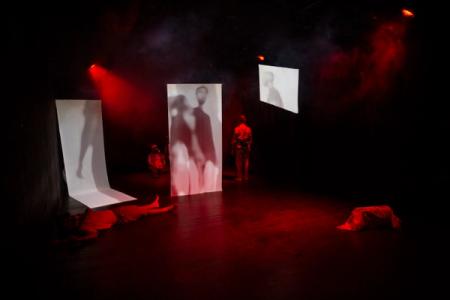
Can you share again the tarot/psychic, divine intervention themes of this piece? And maybe also something on the project you mentioned with Naomi Wallace?
My journey with tarot started during the pandemic, when I decided to buy a set of cards and started reading for family friends. When Ashtar Muallem proposed to me working with her on adapting her show Cosmos in French, into Arabic, I was very thrilled, and after learning about the topic she’s delving into in her piece, I related to her journey of self love and exploration.
My collaboration with Naomi Wallace and Ismail Khalidi, has been a great privilege. Last February, I started talks with Wallace and Khalidi about writing a new adaptation of Guernica by Fernando Aarrabal; which resulted in writing a new original script inspired by Picaso’s painting Guernica. Writing and producing a play during this time has been a great challenge, but the urge we had and still have to express our anger and resilience through theatre and literature has been our drive. The play went through several stages, adapting to the ever changing situation in Gaza. In one day, Rafah was safe and a refuge, and on the following day, it was no longer a safe space as nowhere in Gaza is. Working with two writers living outside of Palestine, but are aware of what’s happening and willing to listen to our needs as Palestinian artists, helped in creating a very rich script that is able to speak to Palestinians and non-palestinians, in a way that only theatre can do.
Please tell me a bit about the experience of devising Love on the Shelf, and perhaps Ventolin of Return which I read a little about…
The trust they put in me as a young director, pushed my confidence to take bigger steps in my directing career. Apart from that, the show was an immersive piece, inviting the audience to be part of the scenes' scenography. Written by Egyptian playwright Laila Soliman, it talks in its comedic farce style about a young woman in her 30s looking for a suitable husband, and a single virgin man in his 40s, struggling with forming a relationship with a woman. Both characters live in a world that continuously penetrates their privacy, and intervenes in their choices in love and freedom and relationships. The play was a departure from the traditional themes and styles Palestinian theatre has been famous for. Almost Woody Allen style.

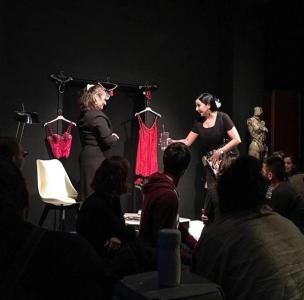
I’ve noticed from the tiny glimpse into Ashtar’s work that you constantly come back to male fragility.
Maybe because the world I create in my work is a mix of dreams and reality, and you need to be somehow fragile to be able to access both worlds together.
How has your film work informed what you do with the stage?
I worked in film as an actor, casting director, and coach. Theatre and film are very different, I’m fascinated by the magic that the camera does, and how it can tell a story in a frame. In my last production Guernica-Gaza, I integrated live video art by Yasmin Omari, and we created together a visual art film that plays with the actors and adds a new dimension to the performance.
I’m inspired by the school of magical realism that has a great effect on my stage work. Directors like David Lynch are inspiration for characters and moods and how to create a world that combines dream and reality together. There’s a contemporary fantasy film called A House in Jerusalem that’s pretty mainstream in its style yet moving. Where a Jewish girl moves from England to Jerusalem following the death of her mother. In the new home she encounters the ghost of a Palestinian girl who was separated from her own family and the two form a bond.
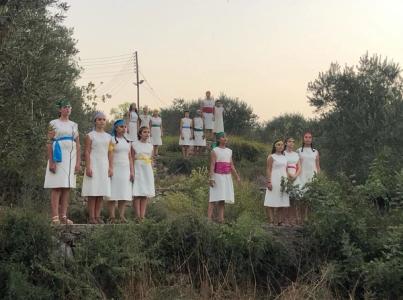
Makes me think of the first relationship we see unfold in the original Beetlejuice, which I only saw for the first time recently! The right to a home. Remaining in the land of the living. I will find it! Thinking about magic realism dealing with the idea of home and politics; I was given an introductory welcome to Palestinian magic realism by Jordanian-Palestinian writer and academic Sanabel Abdelrahemn who I interviewed for Union earlier in the year.
In a workshop with Amman Institute of Performing Arts I asked the actors to bring characters they want to play or they are working on, and to transform them into beasts or creatures. We explored the lines between being human and being this creature and how to find the right balance between the two inside the character. It was a great exercise to explore the world of “magic” with reality.
I wanna do that workshop! Does the whole company work in this playful format?
Awalem is very much magical realism, the things Ashtar can do with her body are very outwardly.

I saw some footage of her suspended.
The show takes the audience on an unexpected journey. The mixture of satire, politics and spirituality is very refreshing.
Ashtar’s psycho-social intervention work is working at full speed right now. Can you talk me through a couple of the specific approaches and processes, and feedback/response you’ve observed? Do you work with international psychologists or practitioners also? How can the global community support this work?
Our approach is to reach as many individuals and groups as possible in the West Bank, Jerusalem, and across Gaza; through designed sessions which provide a space for creativity, expression, movement and solidarity. We use techniques and exercises from theatre of the oppressed, and from improvisational theatre and psychological theatre techniques that support in releasing trauma and empowering individuals.
We have local and international psychologists consultants who work with us and guide our training.

Abstract and avantgarde feel like a wonky term these days. How do we define reality when determining a future is so challenging? Is there anything more futuristic than Palestine?
Indeed, reality has become more abstract than art. This rapid change in the present, makes the future seem uncertain. I totally agree, there is nothing more futuristic than Palestine.
The reality in Gaza and the West Bank is very dystopian, you don’t need to imagine a far away future where humans lose their right to exist and live, where technology mass murders people; you have it here, in Palestine.
In 2077, who wants to survive, created and directed by Simon Eifeler and co-written by Bayan Shbib, we imagine a future not so far away where the whole world is trapped inside of an enclave and artificial intelligence is threatening humanity’s existence. Although the piece doesn’t specify Palestine, it surely amplifies what’s happening to the West Bank and to Gaza, being torn apart and enclaved by a segregation wall inside an open prison surrounded by checkpoints.
Disenchantments comes easy when you’re being told lies everywhere else in life. I don’t believe the world deserves symbolism right now. I saw a Palestine-focused play here in London the other day. My friend was frustrated at its directness. I saw his point, but on reflection is there any other choice?
What you're highlighting is a significant dilemma that Palestinian theatre often grapples with. There are many factors that influence whether symbolism or directness is more appropriate. In this particular case, there's a vast opportunity for exploration.
Personally, I believe that symbolism, when used effectively, can be a powerful tool. However, excessive symbolism may alienate the audience, while too much directness can limit imagination and creativity. Ultimately, there needs to be a balance between the two.
In this current moment, as theatre makers, it's important to be direct and clear about the messages we want to communicate and the emotions we want to evoke.
What would you say to Emile as a boy when he first joined Ashtar, knowing what you know now?
I would tell him not to worry, you are in the right place.

Emile Saba is an actor/director/dramaturg from Ramallah, Palestine. He is Artistic Director at Ashtar Theatre. After training in the Ashtar youth programmes he graduated with an MFA in Stage Performance from the University of Connecticut with an MFA. Some of his credits include Guerncia-Gaza, 2077, who wants to survive. Free play and Love on the Shelf – ASHTAR Theatre, Taming of the Shrew – Al Kasaba Theatre, Monodrama Jabra – Inad Theatre, Opera Amal – Amwaj Choir Group, People by the Sea – The Palestinian Museum, Asimo – The Palestinian Circus.
Interview by Alexandra Pereira